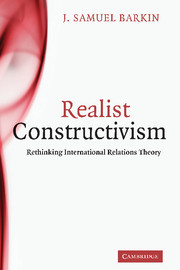4 - The logic of the social
Published online by Cambridge University Press: 05 June 2012
Summary
The second of the oppositions often used in definitions of constructivism is that of rationalism with the logic of the social. The specific terminology of this opposition varies from author to author. For example, in the 50th anniversary issue of the journal International Organization that was organized around the opposition of rationalism and constructivism, John Ruggie contrasts neo-utilitarianism with social construction. Thomas Risse and Ted Hopf both contrast the logic of consequences associated with rationalism with the logic of appropriateness associated with constructivism. Rationalists, in other words, see people making decisions using a strategic logic, based on what will maximize their individual interests. By this definition, by contrast, constructivists see people making decisions using a social logic, based on social norms and the expectations of others.
In one sense this is a perfectly reasonable opposition – an approach to the study of international relations that is based on the idea that politics are socially constructed must be based on a logic of the social. But putting rationalism as the concept in opposition to a logic of the social is problematic in two ways. The first is that it is not clear which concept of rationality is being opposed. In the end, what is being opposed is not the reasoned thought that classical realists referred to when speaking of rationality, but the methodological individualism of microeconomic theory. To the extent that Waltzian neorealism is grounded in microeconomic theory, conflating the two uses is effective as a critique.
- Type
- Chapter
- Information
- Realist ConstructivismRethinking International Relations Theory, pp. 50 - 65Publisher: Cambridge University PressPrint publication year: 2010

